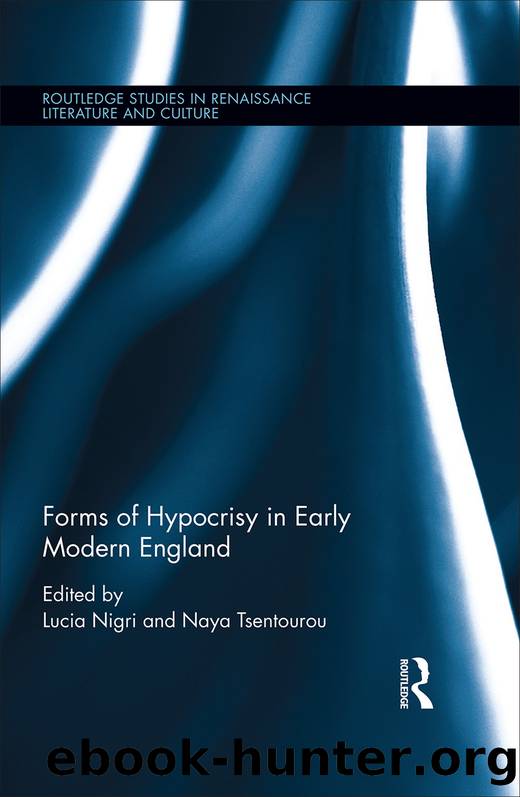Forms of Hypocrisy in Early Modern England by Nigri Lucia Tsentourou Naya & Naya Tsentourou

Author:Nigri, Lucia,Tsentourou, Naya & Naya Tsentourou
Language: eng
Format: epub
Publisher: Taylor & Francis (CAM)
Published: 2018-11-15T00:00:00+00:00
The Commoners
Political themes are also embedded in the comic scene in 3.3, which is entirely focused on the lower classes (see Tipton 1998). The effect of the growing power of the courtesans and diminished authority of the King is the immediate misery of common people, who suffer from the oppression and heavy taxation imposed upon them by the new rulers. Civil unrest grows amongst the citizens, and Nimble is sent to spy on them in order to find traitors. In this context, law is still perceived as a guarantor of commonersâ rights against the abuse of power but when people try to appeal to the law they are immediately rebuked by Nimble or by Tresilian, as in 4.3. When two prisoners, the Shrieve of Kent and the Shrieve of the North, protest against unfair taxation and unlawful imprisonment, Tresilian opposes their claim with his idea of royal authority: âIs not the subjectâs wealth at the Kingâs will?⦠Will you set limits to the Kingâs high pleasures?â (4.3.30 and 40). For the new courtier, power means privilege and liberty to commit abuse. In such circumstances, counterfeiting the words becomes, even for commoners, a matter of survival, as they have to hide their libels against the King and his new favourites so that they sound like innocent songs. The Schoolmaster is the only character who openly says that he âcovered [these verses] rarely⦠for this last line helps all, wherein with a kind of equivocation I say âGod bless my Lord Tresilianââ (3.3.167â8, 192â3). The figure of speech the Schoolmaster employs is irony rather then equivocation, but the use of the term is significant in this context because it clearly supports the hypothesis for a Jacobean dating: as known, the word became more prominent after the Gunpowder Plot of 1605 and the already mentioned Oath of Allegiance of 1606: the Jesuit Father Garnet, who employed it, ended up condemned to death in spite of it.
Self-defence against an oppressive power, therefore, is evoked in the Schoolmasterâs words, as â[e]quivocation was the doctrine designed to prevent this undesirable outcome [torture and execution]. The aim was for the speaker to be able to preserve their status as a truth-teller before God, while deliberately misleading the authorities, keeping the torturers of this world from your doorâ (Berensmeyer and Hadfield 2015, 134). The lyrics the Schoolmaster quotes from the ballad he himself has composed as a libel against the Lord Chief Justice appear nonetheless more as an ironic use of language, as already stated, rather than equivocation. But it appears meaningful that the character considers his song a potential threat to power and considers equivocation the suitable defence against an accusation of treason.
The commoners are described by the words of the nobles (Woodstock and his brothers) as oppressed, heavily taxed and offended by the Court, and in those of the flatterers as an unidentified mass to be exploited. The old lords are the only ones to show preoccupation for the destiny of the people under rapacious rulers, and they protest in front of the King more vigorously than the citizens themselves (1.
Download
This site does not store any files on its server. We only index and link to content provided by other sites. Please contact the content providers to delete copyright contents if any and email us, we'll remove relevant links or contents immediately.
The Power of Myth by Joseph Campbell & Bill Moyers(1046)
Half Moon Bay by Jonathan Kellerman & Jesse Kellerman(977)
Inseparable by Emma Donoghue(971)
A Social History of the Media by Peter Burke & Peter Burke(966)
The Nets of Modernism: Henry James, Virginia Woolf, James Joyce, and Sigmund Freud by Maud Ellmann(888)
The Spike by Mark Humphries;(805)
A Theory of Narrative Drawing by Simon Grennan(773)
The Complete Correspondence 1928-1940 by Theodor W. Adorno & Walter Benjamin(772)
Culture by Terry Eagleton(768)
Ideology by Eagleton Terry;(729)
World Philology by(711)
Farnsworth's Classical English Rhetoric by Ward Farnsworth(706)
Bodies from the Library 3 by Tony Medawar(700)
Game of Thrones and Philosophy by William Irwin(699)
High Albania by M. Edith Durham(695)
Adam Smith by Jonathan Conlin(684)
A Reader’s Companion to J. D. Salinger’s The Catcher in the Rye by Peter Beidler(674)
Comic Genius: Portraits of Funny People by(643)
Monkey King by Wu Cheng'en(641)
